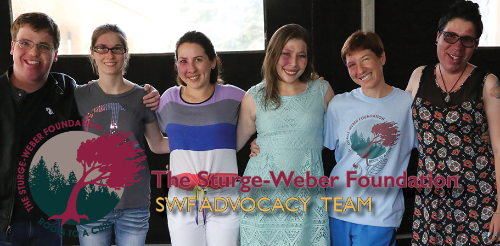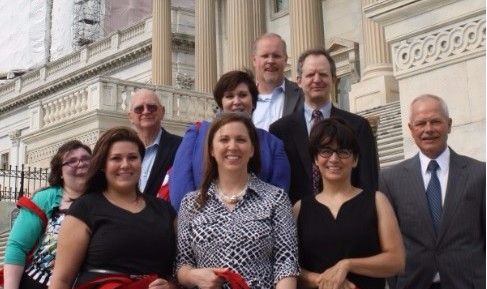
The Sturge-Weber Foundation is Committed to Advocacy.
Members of Congress are directly responsible for Federal programs that advance medical research, facilitate treatment development, and improve the quality and accessibility of healthcare. As a rare disease, it is safe to assume that lawmakers have little to no understanding of Sturge-Weber syndrome and associated conditions and the unique needs of affected individuals. The lack of information on Capitol Hill means that valuable medical research and public health activities may overlook our community.
The best way to ensure that Congress makes decisions, laws, and policies that empower our community is to use your voice and your story to personally educate your elected officials about the condition, the community, and contemporary issues. Connecting with your Members of Congress is easier than you might think. The Foundation is here to educate, assist and support you every step of the way.
Contact members of Congress here.
World Orphan Drug Congress
The World Orphan Drug Congress brings together leading pharmaceutical and biotech companies, government and regulatory authorities, patient advocacy groups, payers, investors, and solution providers. The conference is a place to meet and brainstorm ways to advance orphan drug development and improve access to life-saving therapies.
ARVO
The ARVO Annual Meeting is the premier gathering for eye and vision scientists at all career stages, students, and those in affiliated fields to share the latest research findings and collaborate on innovative solutions.
Monthly Advocacy Update
On a regular basis, the Foundation releases a written update on key issues and our efforts on Capitol Hill. These updates often include instructions on how you can contribute to advancing key issues.
Capitol Hill Advocacy Day
Volunteer advocates travel to Washington, DC, each year for comprehensive advocacy training and meetings with their Members of Congress. This event is an outstanding opportunity to learn about the issues and build relationships with the offices of your elected officials.
Helpful Links and Resources:
SWF Supported Sign-Ons:
-
The U.S. Food and Drug Administration is currently evaluating innovative clinical trial approaches, and they need to hear directly from us—the families, advocates, and organizations who live every day with the realities of DEEs. Several companies are considering basket trials and other flexible trial designs that could finally accelerate access to new therapies. But to move these efforts forward, the FDA must see clear, unified support from our community.
-
The American Society of Gene & Cell Therapy (ASGCT) | The PRV program has proven to be a powerful catalyst for private investment in early-stage cell and gene therapy (CGT) programs that address serious, unmet medical need in pediatric populations, with no additional expenditure of taxpayer dollars. Without this incentive, many promising therapies may never reach the children and families who desperately need them.
-
Work toward the enactment of the fiscal year (FY) 2026 Defense Appropriations Act, to ensure full funding levels for the Defense Health Research Programs, including the Congressionally Directed Medical Research
Programs (CDMRP). -
Nov 2025 | Federal Government Shutdown Update
Last night, the Senate voted 60-40 to advance a short-term continuing resolution that would fund the government through January 30th, 2026, as well as a three-bill minibus containing the Military Construction-VA, Agriculture-FDA, and Legislative Branch appropriations for FY26. If enacted, these agencies would receive full FY26 funding and would not risk any future shutdown disruptions this year. The deal also requires a vote on enhanced advanced premium tax credits (eAPTCs) before the end of the year. The Senate must vote again on this, and if that passes, it will then go over to the House, where the measure is expected to pass. President Trump has already signaled his support for the package. For more background on the situation, including some reactions from members on both sides of the aisle, check out this Politico article (https://www.politico.com/news/2025/11/09/government-funding-deal-on-track-to-advance-sunday-night-00644110). This is a constantly changing situation, so please feel free to reach out if you have any questions.
What's in and not in the package: Positives are that the deal would reopen the government, direct funding to be available to retroactively pay federal employees, and protect employment for federal employees who were laid off since the shutdown began. The deal also includes a few appropriations bills that would finalize FY 2026 funding for the Food & Drug Administration at $6.95 billion and the VA Epilepsy Centers of Excellence at $29 million (about a $4 million increase from FY 2025), as well as extend Medicare telehealth flexibilities until January 30, 2026. Unfortunately, the deal does not include an extension of the enhanced Affordable Care Act subsidies-with only a promise to vote on that extension in the future.
Expected timing moving forward: Further action in the Senate is expected as soon as tonight. The Senate must vote again on this, and if that passes, it will then go over to the House, where the measure is expected to pass quickly. President Trump has already signaled his support for the package. This is a constantly changing situation, so please feel free to reach out if you have any questions.
-
Support for the National Plan for Epilepsy Act, H.R. 1189/S. 494. Read the full support letter by clicking the title above.
-
The Epilepsy Foundation of America (along with The SWF) asking that an epilepsy objective be included in Healthy People 2030, as it was in Healthy People 2020.
-
July 2024 | This legislation’s goal was to accelerate medical innovation and improve care by delivering new advances to people with epilepsy and other disorders. In 2019, Representatives DeGette and Upton introduced the 21st Century Cures Act 2.0 (Cures 2.0) to build upon the efforts of the first bill. Since 2019, parts of Cures 2.0 have been enacted through legislation and regulation.
-
4/2/24 | We are happy to announce the submission of the Brain Research Through Advancing Innovative Neurotechnologies (BRAIN) Initiative and the Neurology Drug Program (NDP) sign-on letters. The BRAIN Initiative letter was submitted to the House and Senate Subcommittees on Labor, Health, and Human Services and Education Appropriations. The BRAIN Initiative is revolutionizing our understanding of the brain and offering hope for the millions of individuals impacted by brain diseases, disorders, and injuries.
-
4/2/24 | We are happy to announce the submission of the Neurology Drug Program (NDP) sign-on letter. the NDP letter was submitted to the House and Senate Subcommittees on Agriculture, Rural Development, and Food and Drug Administration Appropriations. Support for this program will allow the FDA to gain the expertise to develop policies and guidance that keep pace with emerging brain science.
-
One in three Americans will have a brain or nervous system disorder sometime in their life, and the cost of treating neurological disorders is nearly $1.5 trillion each year. The BRAIN Initiative is revolutionizing our understanding of the brain and offering hope for the millions of individuals impacted by brain diseases, disorders, and injuries.
-
As your subcommittees begin to craft FY 2025 appropriation legislation, we ask that you provide $5 million for this important program, an
increase of $3 million. Funding at this level will help advance discoveries in all areas of brain health including neurodevelopmental, neurodegenerative, psychiatric, brain injuries, and more. -
Our organization is proud to join together with epilepsies stakeholders across the United States in asking President Biden to increase funding for epilepsies research.
-
Support for HR 485 Prohibiting the use of Quality Adjusted Life Years (QALY) in federal programs with Haystack Project sign-on information.
-
Would ensure that employer plans/PBMs offer an expedient and medically reasonable step therapy exceptions process. This will empower individuals to navigate their insurance and help them access the treatments they need in time.
-
Over 100 patient and provider organizations, including The Sturge-Weber Foundation, are asking Congress to pass PBM reform and include the #SafeStepAct to help patients directly. The Safe Step Act (S.652/HR2630) could potentially be included in a PBM reform bill that is being worked on in Congress.
-
NIAMS (National Institute of Arthritis and Musculoskeletal and Skin Diseases) Coalition, representing millions of Americans with chronic conditions and diseases of the bones, joints, muscles and skin, as well as the professionals who serve them, write in strong support of the National Institutes of Health (NIH) Clinical Trial Diversity Act (H.R. 3503).
-
 Dr. Kristen Kelly, Dermatology, California
Dr. Kristen Kelly, Dermatology, California"The Foundation advocates for the patients both on a national level at Congress and then throughout a variety of other funding agencies."







